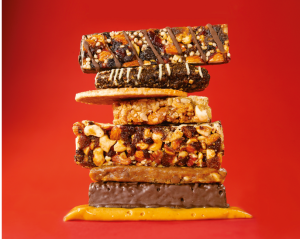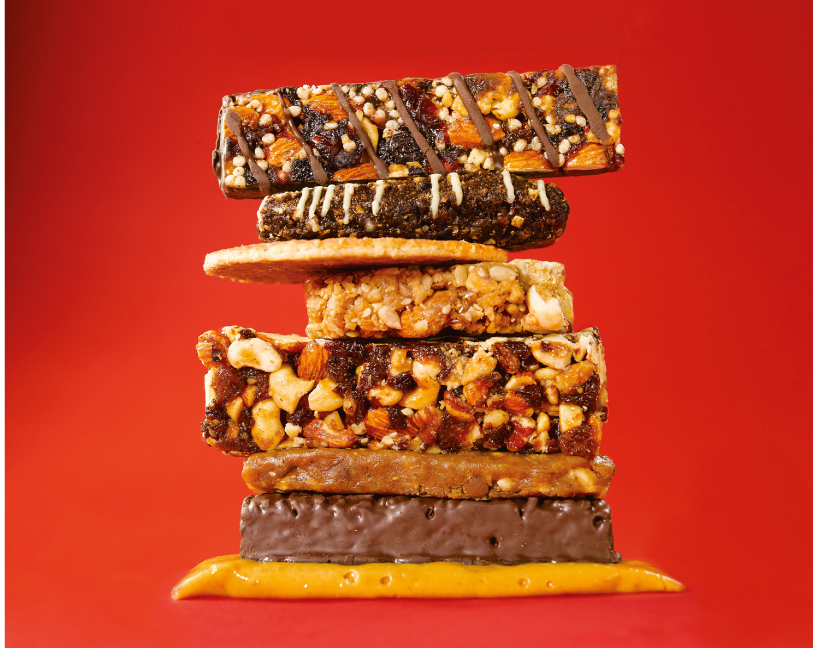
“You need to consider when you plan to eat the bar,” says Tara Gidus, registered dietician and runner.
Before a run, for example, you want the right amount and type of carbs for an energy boost – without a trip to a Port-a-Loo. Afterwards, you need more protein.
Here’s how to find the perfect bar for every running situation.
Pre- or mid-run boost
You’re dashing out the door for a run when you realise you haven’t eaten in hours, or you’re in the middle of a workout and need a quick energy boost. Grab a bar with maltodextrin. This lab-formulated carbohydrate is more quickly absorbed than other carbohydrates, so it delivers a fast hit of fuel. “When you need a rapid rise in blood sugar, maltodextrin is a good choice,” says Gidus. It’s also easier on the stomach than the concentrated glucose found in some sports drinks. Because maltodextrin is relatively tasteless, it’s a useful choice when you want to avoid overly sweet gels and chews, which can leave an unpleasant aftertaste during your run.
A good bar: USN’s Energy Pro Bar contains maltodextrin, packing 24 grams of carbs in 573 kilojoules. Calcium and sodium help prevent cramps. And its low fibre content won’t tax your stomach (usn.co.za).
Mid- to long-run energy
During medium- to long-mileage runs, you need easily digestible energy that won’t send your blood-sugar levels on a roller-coaster ride. Pick a bar that contains a variety of ingredients such as oats and fruit. This mix gives you carbohydrates (glucose and fructose) that deliver fast and long-lasting fuel. “Fructose is absorbed relatively slowly,” says Gidus, “so its energy is released over time, while glucose is fast-acting.”
Plus, studies show that consuming those two types of carbs at once increases the amount of energy your muscles can use and improves performance, says Gidus. A comprehensive bar like this will usually also contain B vitamins, calcium, and iron.
A good bar: Mule Bar Mango Tango is fresh and naturally sweet-tasting. It provides 36 grams of carbs, four grams protein and iron – responsible for creating haemoglobin, which transports oxygen to your hard-working muscles (mulebar.com). Available at Dis-Chem Pharmacies.
Lunch replacement
If back-to-back meetings mean you’ll have to skip a sit-down meal, grab a high-kilojoule bar with extra fibre and protein. It should contain 1 400 to 2 000kJ, nine grams of protein or more, and high-fibre carbohydrates, such as seeds, whole oats, and dried fruit. You also want some healthy fat (from nuts, for example), which, says Christine Gerbstadt, a registered dietician and spokesperson for the Academy of Nutrition and Dietetics, “helps you absorb vitamins more effectively and keeps you feeling satisfied.”
A good bar: Green Vibrance Meal Bars fill in as a lunchtime standby. They contain fibre, protein, and other run-fuelling nutrients, including 15 per cent of your Daily Value (DV) for iron, and nine per cent for potassium, to stave off muscle cramps. (naturalvibrance.co.za). Available from health food stores.
Post-run immunity boost
The high mileage needed to train for a marathon or ultra makes you susceptible to colds and the flu. Good time to try an antioxidant-packed bar. “The more intense your exercise is, the more you need antioxidants to help you recover,” says Gidus. “There’s good research suggesting that selenium, vitamin E, and other antioxidants help protect the immune system.” Nuts and dried fruits are rich in these antioxidants; cherries in particular contain phytochemicals, which help protect against cancer and heart disease, and help reduce inflammation.
A good bar: After a run or as a snack, try Mule Bar Jimmy’s Choc Orange – it packs key immune-boosting antioxidants: vitamins A, C, and E, from orange and lemon peel. (mulebar.com)
Long-run pain reflief
When the 24th kilometre of your 35-K has your body begging for ibuprofen, reach for a jolt of caffeine instead. A study published in 2009 in the International Journal of Sport Nutrition and Exercise Metabolism found that it reduces exercise-related pain during workouts. Study participants who consumed caffeine prior to high-intensity cycling reported less quadricep pain than those who did not consume it. Researchers believe that caffeine blocks the brain’s receptors for adenosine, a chemical released in response to inflammation.
A good bar: Honest Raw Organic Chocolate comes with a big dose of caffeine. Eat two or three blocks per hour of running. Eating too much could keep you up all night. (honestchocolate.co.za).
Post-workout recovery
When you want a nutrient-rich recovery snack but don’t have time to seek out the perfect whole food, eat a carb-rich bar with moderate doses of protein and fibre (five to 10 grams of each for a bar with about 800kJ). “Post-run, these nutrients can help improve recovery and curb hunger,” says Gidus.
For the greatest recovery benefit, eat a bar within 20 minutes of your run. If your workout was particularly hard or long, follow that with a light meal of protein and whole-grain carbs, one to two hours later.
A good bar: Bar Hammer Bar’s Cashew Coconut Chocolate Chip packs 27 grams of carbs with five grams of protein and fibre (hammernutrition.co.za). Really tough runs call for the 24 grams of protein in Evox’s Synergy Protein Bar – it contains vitamin E, which helps repair muscles after long runs (evox.co.za).

